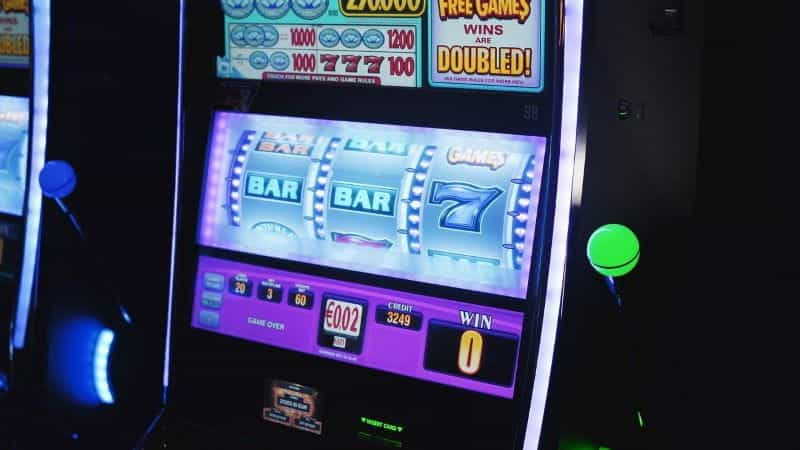New Design Rules for Online Slots
The Gambling Commission has announced a series of strict new measures designed to make online slots and casino games safer for players. The new design rules follow a public consultation, and will see curbs imposed on the speed of games and features that celebrate losses.

Stake caps on fixed odds betting machines are limited to £2, but could a similar cap be imposed on online slots? ©AidanHowe/Pixabay
Reverse Withdrawals Banned
The gambling industry has been bracing itself for months with the expectation that new legislation will be brought in after the government’s gambling act review. Now it seems that some of those big changes are to come in early, as the regulator has announced new restrictions for online casino game design. Chief executive of the Gambling Commission, Neil McArthur, explained that these changes are designed to make gambling safer and are based on thorough evidence, adding:
“To make online games safer we are introducing a ban on features that speed up play, or give the illusion of control over the outcome. We are also introducing a ban on auto-play, losses disguised as wins, and slot spin speeds faster than 2.5 seconds. The evidence shows that these features increase the risk of harm to customers.”
To gather information on what changes are necessary, the Gambling Commission held a consultation with players, industry members and stakeholders. Out of that consultation, the need for some radical design curbs became clear. Now the regulator has outlined how online slots must look and function moving forwards, in a bid to strengthen player protections and boost controls for consumers.
For four of the main online slot features an outright ban has been announced. That means no more spin speeds faster than 2.5 seconds, or features that speed up play or give players the impression that they can control an outcome. Autoplay features will also be banned as well as imagery and sounds that celebrate losses as wins. Online slots often celebrate “wins”, even if the player has actually lost based on the original stake. For example, a game might celebrate a £1 win even when the stake cost £2, meaning that the player has lost £1.
Other limitations will also come into place, including a permanent ban on reverse withdrawals. Players will no longer have the option to gamble again with money that they have already asked to withdraw. Operators will also have to ensure that total losses and wins are displayed clearly, alongside the length of time that the customer has been playing.
Evidence Shows Risk of Harm
There is reasoning behind these considerable changes. According to the regulator, it has chosen to target online slots because evidence has shown that these features make gameplay more intense and heighten risk. Compared to other online gambling products, slots have shown the highest average losses per player. Data collected on gambling behavior last November showed that on average, slots players spent £67 per month, versus £36 for casino products and £45 for betting.
Operators have until October 31st, 2021 to fully implement the new design rules. In its statement announcing the curbs, the Gambling Commission pointed out that new research has further highlighted the need to implement better player protections. Evidence has shown links between players who have lost track of play and the use of autoplay features. This feature can make it hard to stop playing, and has led some players to gamble with a number of products at the same time.
The regulator also found that reverse withdrawal features placed players at risk by allowing them to give in to the temptation to continue gambling. The bans and limitations placed on certain slot features have all been carefully considered and come after associated findings of binge playing, increased intensity and loss of control. Sports, Tourism and Heritage minister, Nigel Huddleston, welcomed the regulator’s announcement, saying:
“Today’s steps will help curb the intensity of online gambling, introducing greater protections that will reduce the risk of gambling related harm. I welcome the Gambling Commission’s tough measures as we continue our comprehensive review of gambling laws to make sure they’re fit for the digital age.”
As the UK’s industry regulator, the Gambling Commission has been instrumental in making gambling safer and fairer for the consumer. Some examples of how it has already worked towards this goal include strengthened protections around online ID and age verifications, as well as boosted interaction procedures for at-risk customers. Last year, it oversaw an outright ban on gambling with credit cards, to stop players from gambling with money that they could not pay back.
Stake Caps to Follow?
Last September, the regulator also announced plans to clamp down on irresponsible VIP customer practices. Changes, which mean that operators must now complete certain checks before accepting customers into VIP schemes, came into force on October 31st, 2020. That includes making sure that customer details are accurate and up to date, source of funds checks and assessing the risk of gambling harms to individuals.
Online slots are one of the biggest sources of revenue for the UK’s gambling industry, constituting up to 70% of its income and worth around £2.2 billion a year. The coronavirus pandemic, has caused difficulties for high-street betting shops and bricks and mortar casinos, which have both experienced long periods of closures. Online casinos have fared better though, as lockdown has meant people are spending more time at home without other sources of entertainment.
The Gambling Commission’s announcement will come as good news to campaigners and MPs, who have long aired their criticism of the UK’s lax rules on online slots. In 2018, stake caps on fixed odds betting terminals were cut from £100 to just £2, following pressure from the Gambling Related Harm APPG. The machines were dubbed the “crack cocaine of gambling” by those who pointed to alarming rates of addiction amongst users. Now the online equivalent will also face curbs, although a stake cap has not come in just yet.
The government’s review of the 2005 Gambling Act is expected to go further still in reigning in legislation, with a ban on gambling firms sponsoring football shirts expected. While there is evidence that fans would support such a ban, it could be an unpopular move amongst clubs that are reliant on the income and amongst gambling operators themselves.



